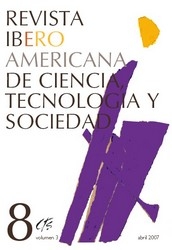The Re-enchantment of Science or the Recovery of Normativity as a Philosophical Contribution of STS to Governance
DOI:
https://doi.org/10.52712/issn.1850-0013-955Abstract
In The Philosophy of Science and Technology Studies, Steve Fuller invokes the Weberian concept of "re-enchantment" to suggest how science should be transformed in order to better fulfill its goal of serving society. Today, science is an enterprise lacking a deep, coherent sense of meaning, despite its immeasurable impact on the daily lives of citizens. Without losing its technological effectiveness, the cost of having a "disenchanted" science is the failure to provide a scientific defense of human freedom—something that goes beyond the concept of technoscience and takes us into the realm of values and normativity. It should be understood that speaking of normativity from the perspective of science, technology, and society studies (STS) carries different implications than normativity as understood in analytic philosophical approaches.
Downloads
References
AMBROGI, A. (1999): “Filosofía de la ciencia: el giro naturalista”, en A. Ambrogi: Filosofía de la ciencia: el giro naturalista, Palma, Universitat de les Illes Balears, pp. 65-66.
BARRON, C. (2003): “A strong distinction between humans and non-humans is no longer required for research purposes: a debate between Bruno Latour and Steve Fuller”, History of the Human Sciences, 16 (77), p. 81. (Disponible en http://hhs.sagepub.com/cgi/content/abstract/16/2/77)
FULLER, S. (2000): Thomas Kuhn: A Philosophical History for Our Times, New Delhi, Orient Longman Private Limited.
FULLER, S. (2002 [1988]): Social Epistemology, Bloomington, Indiana University Press (2ª edición).
FULLER, S. (2006): The Philosophy of Science and Technology Studies, New York (USA), Oxon (UK), Routledge.
GIERE, R. (1999): “La filosofía de la ciencia naturalizada”, A. Ambrogi: Filosofía de la ciencia: el giro naturalista, Palma, Universitat de les Illes Balears, pp. 103-134.
GONZÁLEZ GARCÍA, M., J. A. LÓPEZ CEREZO y J. L. LUJÁN LÓPEZ (2000): Ciencia, tecnología y sociedad: una introducción al estudio social de la ciencia y la tecnología, Madrid, Tecnos.
KITCHER, P. (1992): “The Naturalists Return”, The Philosophical Review, Nº 101,(Philosophy Review: Essays on Contemporary Philosophy), pp. 53-114.
LÓPEZ CEREZO, J. A. (1999): “Ciencia y tecnología como formas de conflicto social”, en A. Ambrogi: Filosofía de la ciencia: el giro naturalista, Palma, Universitat de les Illes Balears, pp. 319-340.
LÓPEZ CEREZO, J. A., J. A. MÉNDEZ SANZ y O. TODT (1998): “Participación pública en política tecnológica: problemas y perspectivas”, Arbor CLIX/627, pp. 279-308.
NEURATH, O. (1942): “International Planning for Freedom”, en M. Neurath y R. S. Cohen (eds.) (1973): Empiricism and Sociology, Dordrecht / Boston, D. Reidel Publishing Company.
PARRINI, P. S., C. WESLEY y M. SALMON (eds.) (2003): Logical Empiricism. Historical and Contemporary Perspectives, University of Pittsburgh Press.
REISCH, G. A. (2005): How the Cold War Transformed Philosophy of Science. To the Icy Slopes of Logic, Cambridge, Cambridge University Press.
SOLOMON, M. (2001): Social Empiricism, Cambridge, MA, MIT Press.
Downloads
Published
How to Cite
Issue
Section
License
Copyright (c) 2025 CC Attribution 4.0

This work is licensed under a Creative Commons Attribution 4.0 International License.
All CTS's issues and academic articles are under a CC-BY license.
Since 2007, CTS has provided open and free access to all its contents, including the complete archive of its quarterly edition and the different products presented in its electronic platform. This decision is based on the belief that offering free access to published materials helps to build a greater and better exchange of knowledge.
In turn, for the quarterly edition, CTS allows institutional and thematic repositories, as well as personal web pages, to self-archive articles in their post-print or editorial version, immediately after the publication of the final version of each issue and under the condition that a link to the original source will be incorporated into the self-archive.











